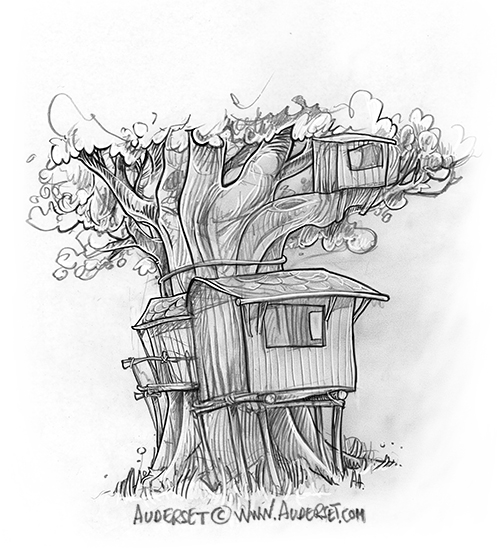
Grandpa Paco leaves Spain for the first time; he comes to visit us in Switzerland.
He’s a calm, open person. It doesn’t matter how much time he has left, he shares it with others generously, selflessly. Together we built a dream tree-house in the big oak tree next to the house.
Going for a walk with him in the village is a real pleasure. This little man loves everything that passes before his eyes (the whole of Switzerland, in fact!); it’s very enjoyable being with him. However, he doesn’t speak a word of French, not the slightest thing, but he doesn’t give a hoot, so much so that it is almost something to behold.
For example, when we come across a man who is busy feeding begonias, geraniums or other exotic specimens in his garden with croquettes (yes, I know, you shouldn’t give beef to begonias!), Paco goes up to the fence and immediately starts up a conversation:
‘Hola ! Mira que flores tan bonitas teneis usted!’
Disconcerted, the amateur gardener retorts with something along the lines of:
‘Euh… sorry, I… no comprendo.’
So my grandpa gesticulates, points to the flowers in the garden to congratulate him on their beauty, ‘cos he thinks they are (of course…!) exceptional. The budding horticulturalist, touched by the compliment, gives him an embarrassed thank you (no need to know the language to understand a real thank you).
Grandpa Paco carries on straightaway, speaking about lots of other things (in Spanish) without being in the least bit bothered by the consternation of the man he is speaking to. The Swiss man, respectful by nature, concentrates in order to understand and reply as best he can. Removed from his conventional and rather tedious comfort zone of things left unsaid, there he is now, engaged in the adventure of a ‘discussion’ full of exotic colours.
So I am witness to the birth of a new kind of jargon, unique to them and which will only ever belong to them both. It’s made up of words borrowed from their two respective languages, large gestures nearing choreography, stammered phrases and reciprocal laughs. When my grandfather goes back to his walk where he left off, the two new pals warmly say and wave goodbye to each other. The gardener goes back to his plot, his nose in his flowers (it is well known that begonias kiss you on the nose if you feed them correctly), with an added smile (that must have brought back memories of his holidays).
That’s what my grandpa was like: everyone loved him (it was impossible to do otherwise).
Granddad’s loveliest present
Granddad’s tree-house is no more.
It was completely dismantled over time, but it has remained intact in my memory. And, strangely, despite the years that have gone by, the gratitude that I had for that exceptional present still lives in me.
Granddad is no more, either
But he left me this fantastic lesson of life, which had nothing to do with school, by simply being himself. Watching him, I understood that the desire to enter into contact with your neighbour (as well as with those who live further away) is more important than the means of achieving it. Because a lack of means is often an excuse for not facing up to the fact that the real barriers are prejudices.
But the loveliest present that my granddad left me is, even more, an exceptional mother, who would not have been the same without him.
* It’s on this trip that he also sees the sea for the first time.


